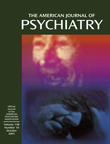Dr. Hirschfeld Replies
To the Editor
In response to the letter from Dr. Mago regarding the Mood Disorder Questionnaire, I agree fully that bipolar spectrum disorders are heterogeneous and differ substantially in ease of diagnosis. Patients with bipolar II disorder may well be more difficult to diagnose than patients with bipolar I disorder because they may not regard themselves as having a mood disorder.
We have no exact numbers on how many patients refused to fill out the questionnaire, but our impression was that the overwhelming majority agreed to complete it. A random sample of those who filled out the Mood Disorder Questionnaire was chosen to complete the SCID telephone interview. Those selected for interviewing ranged from those who checked a large number of symptom items to those who checked none or only a few.
We agree that the clinical state of the individual at the time of completion of the Mood Disorder Questionnaire might well affect the responses. This idea was not addressed in the original study, but we have begun an ongoing study that will examine this important issue. We remind Dr. Mago that the Mood Disorder Questionnaire is a screening form and not a diagnostic instrument. It cannot substitute for the comprehensive psychiatric evaluation of a patient.



